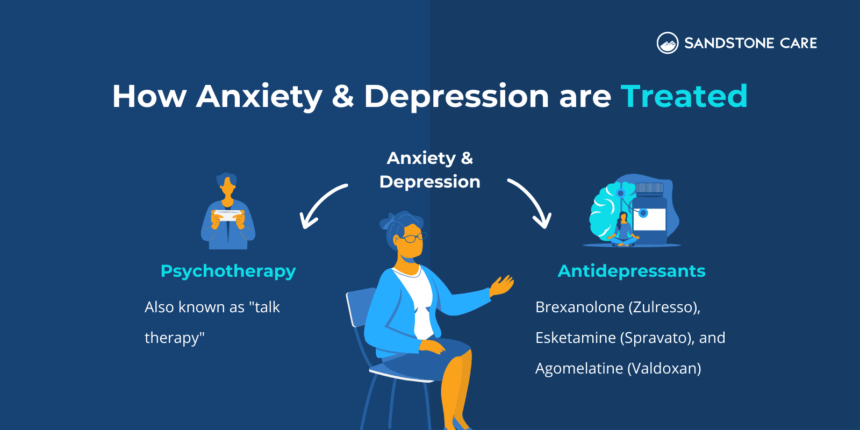In today’s busy world, many of us deal with feelings of anxiety and depression at some point in our lives. But did you know that there are alternative therapies out there that can help ease these feelings and promote overall well-being?
Let’s dive into what anxiety and depression are, what causes them, and explore some alternative therapies that might just be what you need to feel better.
What are Anxiety and Depression?
We're now on WhatsApp. Click here to join.
Anxiety and depression are two common mental health conditions that can have a significant impact on a person’s daily life.
Anxiety: Anxiety is like having a constant worry monster living in your brain. It’s that feeling of nervousness, fear, or unease about something that hasn’t happened yet or might not even happen at all. It can make your heart race, your palms sweaty, and your mind race a mile a minute.
Depression: Depression is like being stuck in a dark cloud that won’t go away. It’s more than just feeling sad or down—it’s a persistent feeling of hopelessness, worthlessness, and emptiness. It can drain your energy, dampen your mood, and make it hard to enjoy the things you used to love.
Causes of Anxiety and Depression
Anxiety: Anxiety can be caused by a variety of factors, including genetics, brain chemistry, personality, and life experiences. Some people may be more prone to anxiety due to their genetic makeup, while others may develop it after experiencing traumatic events or stressful situations.
Depression: Similarly, depression can also have a variety of causes, including genetics, brain chemistry, hormones, and life events. It can run in families, and certain life events like loss, trauma, or major changes can trigger or contribute to its development.
Related: 15 Best Foods for Improved Gut Health
Alternative Therapies for Anxiety and Depression
Now that we understand a bit more about anxiety and depression, let’s explore some alternative therapies that can help alleviate symptoms and promote mental well-being:
- Mindfulness and Meditation:
Mindfulness and meditation are practices that involve paying attention to the present moment without judgment. They can help calm the mind, reduce stress, and improve overall emotional well-being. Try setting aside a few minutes each day to sit quietly and focus on your breath or engage in a guided meditation. - Yoga:
Yoga combines physical postures, breathing exercises, and meditation to promote relaxation and reduce stress. It can help increase body awareness, improve flexibility, and enhance mood. Even just a few minutes of yoga each day can make a big difference in how you feel. - Exercise:
Regular physical activity has been shown to be an effective way to reduce symptoms of anxiety and depression. Exercise releases feel-good chemicals called endorphins, which can boost mood and reduce stress. Aim for at least 30 minutes of moderate exercise most days of the week, whether it’s walking, biking, dancing, or playing a sport. - Art Therapy:
Art therapy involves using creative activities like drawing, painting, or crafting as a way to express emotions and reduce stress. It can provide a sense of accomplishment, improve self-esteem, and offer a distraction from negative thoughts and feelings. - Aromatherapy:
Aromatherapy involves using essential oils extracted from plants to promote relaxation and improve mood. Scents like lavender, chamomile, and bergamot are known for their calming properties and can be used in diffusers, baths, or massage oils to help reduce anxiety and depression. - Acupuncture:
Acupuncture is a traditional Chinese medicine practice that involves inserting thin needles into specific points on the body to promote energy flow and balance. It can help reduce anxiety, improve sleep, and alleviate symptoms of depression by stimulating the release of endorphins and other feel-good hormones. - Herbal Supplements:
Certain herbs and supplements, such as St. John’s wort, chamomile, and passionflower, have been used for centuries to treat anxiety and depression. While more research is needed to confirm their effectiveness, some people find relief from symptoms by incorporating these supplements into their daily routine. - Journaling:
Writing down your thoughts and feelings in a journal can be a therapeutic way to process emotions and gain insight into your mental state. It can help you identify patterns, track your progress, and release pent-up emotions in a safe and private space.
Related: Exploring Essential Oils for Relaxation and Stress Relief
While traditional treatments like therapy and medication can be helpful for managing anxiety and depression, alternative therapies offer additional tools and techniques for promoting mental well-being.
Whether it’s mindfulness meditation, yoga, or aromatherapy, there are plenty of options to explore and find what works best for you.
Remember, it’s essential to consult with a healthcare professional before starting any new treatment regimen, but don’t be afraid to explore alternative therapies as part of your mental health journey.
See This: Anxiety – Causes, Treatments, Effects, And Types





